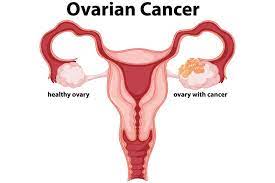
INTRODUCTION
Ovarian cancer is the growth of cells that forms in the ovaries. The cells multiply quickly and can invade and destroy healthy body tissue.The female reproductive system contains two ovaries, one on each side of the uterus. The ovaries — each about the size of an almond — produce eggs (ova) as well as the hormones estrogen and progesterone.
Symptoms of Ovarian Cancer
When ovarian cancer first develops, it might not cause any noticeable symptoms. When ovarian cancer symptoms happen, they’re usually attributed to other, more common conditions.
Signs and symptoms of ovarian cancer may include:
1. Abdominal bloating or swelling
2. Quickly feeling full when eating
3. Weight loss
4. Discomfort in the pelvic area
5. Fatigue
6. Back pain
7. Changes in bowel habits, such as constipation
8. A frequent need to urinate
Some factors that can increase your risk of ovarian cancer include:
1. Age (risk increases for women over 50)
2. Family history of ovarian, breast or bowel cancer
3. Changes in the genes BRCA1 or BRCA2
4. Early onset of periods (before 12 years) and late menopause
5. Women who have not had children or had their first child after the age of 35
6. Using oestrogen-only hormone replacement therapy or fertility treatment.
Diagnosis of Ovarian Cancer
1. Physical examination during which the doctor will check your abdomen for any lumps and do an internal vaginal examination.
2. Blood tests to check for a common tumour marker for ovarian cancer, CA125.
3. Pelvic ultrasound which uses echoes from soundwaves to create a picture of your ovaries and uterus.
4. CT scan which uses x-rays to take images of the inside of your body to check for cancer and to see if it has spread.
5. PET scan which highlights abnormal tissues in the body.
6. Colonoscopy which is a bowel examination to ensure that symptoms are not caused by a bowel problem.
These tests can show if there are any abnormalities but a biopsy (taking a tissue sample) is the only way to confirm a cancer diagnosis.
Causes of Ovarian Cancer
It’s not clear what causes ovarian cancer, though doctors have identified things that can increase the risk of the disease. Doctors know that ovarian cancer begins when cells in or near the ovaries develop changes (mutations) in their DNA.
A cell’s DNA contains the instructions that tell the cell what to do. The changes tell the cells to grow and multiply quickly, creating a mass (tumour) of cancer cells. The cancer cells continue living when healthy cells would die. They can invade nearby tissues and break off from an initial tumour to spread (metastasize) to other parts of the body.
Prevention of Ovarian Cancer
There’s no sure way to prevent ovarian cancer but there may be ways to reduce your risk.
Here are some prevention tips that you can try out:
1. Consider taking birth control pills.
Ask your doctor whether birth control pills (oral contraceptives) may be right for you. Taking birth control pills reduces the risk of ovarian cancer but these medications do have risks, so discuss whether the benefits outweigh those risks based on your situation.
2. Discuss your risk factors with your doctor.
If you have a family history of breast and ovarian cancers, bring this up with your doctor. Your doctor can determine what this may mean for your own risk of cancer. You may be referred to a genetic counsellor who can help you decide whether genetic testing may be right for you. If you’re found to have a gene change that increases your risk of ovarian cancer, you may consider surgery to remove your ovaries to prevent cancer.
Treatment for Ovarian Cancer
Staging
